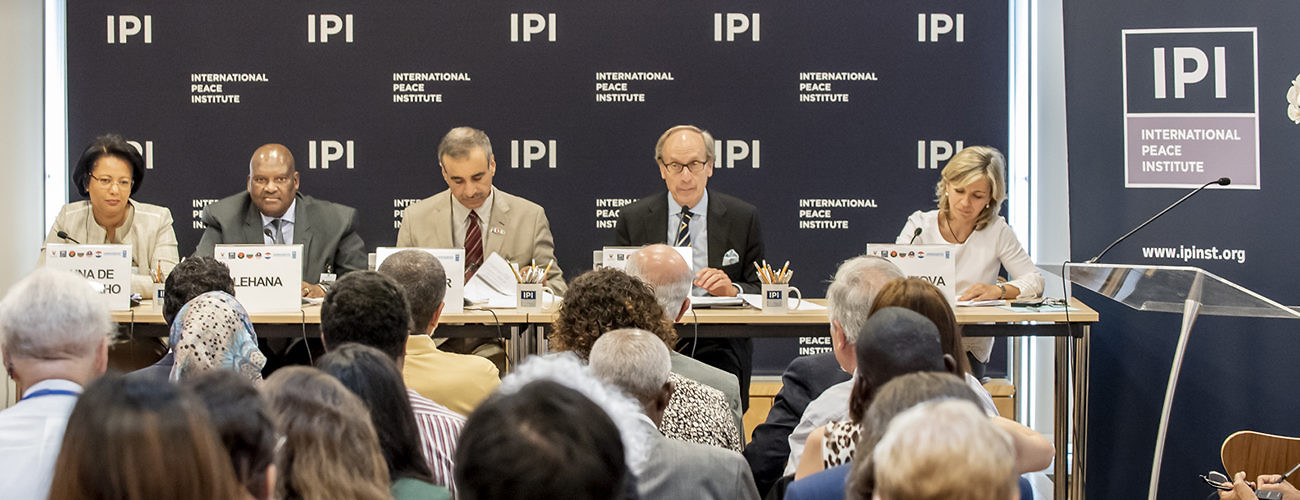“The lack of affordable housing makes other human rights increasingly unaffordable,” said Olga Algayerova, Executive Secretary of the United Nations Economic Commission for Europe, pointing up the centrality of suitable housing to the overall rights agenda. “It makes discussion on achieving adequate, safe, and affordable housing through the implementation of the global and regional international accords on sustainable development so timely.”
Such a discussion took place at IPI on July 17th in a ministerial side event to the 2018 High-Level Political Forum on Sustainable Development on the subject of Affordable Housing for All. Sponsored by IPI and the Kingdom of Bahrain and co-organized by the governments of Angola, Bulgaria, Malaysia, and Paraguay, in cooperation with UN-Habitat and the UN Development Programme (UNDP), the event drew comment from a number of ministers and high-level UN officials and focused in particular on Sustainable Development Goal 11.1, which reads, “By 2030, ensure access for all to adequate, safe and affordable housing and basic services and upgrade slums.”
Maimunah Mohd Sharif, UN Under-Secretary-General and Executive Director of UN-Habitat, set the broad parameters of the conversation, saying, “We put people and human rights at the center, because homes and communities are more than a roof and walls but the right to live with security, peace, and dignity. We believe in leaving no one behind and paying special attention to the poor, women, youth, and those who live in slums.”
Elaborating on the point was Mourad Wahba, Assistant Secretary-General and Director of UNDP’s Regional Bureau for Arab States. “Adequate, affordable, and safe housing is not an economic and infrastructure issue; it’s an issue of poverty and how we deal with it,” he said. In addition, he argued, it was also an urban planning “resilience” concern and a governance and political issue how about how people organize their lives.
The event opened with a video from Bahrain’s Ministry of Housing chronicling the Kingdom’s creation of more than 140,000 homes, much of it a result of a 16-year-old collaboration between the country, UN-Habitat, and UNDP. Underway now is the building of five new housing towns, said Basim Bin Yacob Al Hamer, Bahrain’s Minister of Housing, who added that the private sector is now engaged in a social housing plan which aims to assist those on waiting lists to get financing and to obtain governmental support for home purchases. As a result of the $10 billion plan, he said, 65 percent of those once on the waiting list now own their homes. “Housing plays a major role in social justice and making the communities prosper and live in a good healthy condition, and this is basically how we look at housing in Bahrain,” he said.
Habofanoe Lehana, Minister of Local Government, Chieftainship, and Parliamentary Affairs of Lesotho, said the main challenge in his country was an absence of planning. “We have quite a sizable number of houses which have good quality but because of a lack of planning they turn into slums because they are located in areas where there is no infrastructure or where it is very expensive to produce infrastructure.” He said the government has sought to involve the private sector and has created cross-subsidization and microfinance plans under which low income people can afford housing.
Another focus, he said, was creating more economical building technologies. “We are soon having a company establish a factory in Lesotho which will be manufacturing what you call ‘concrete panels’, and that has cut the cost of housing by almost 40 percent,” he said. “Our set of objectives is directly linked to achieving housing for all and SDG 11, and we know that housing is a cross-cutting issue with a multiplier effect on other sectors such as infrastructure, water, sanitation, and energy, and so this policy tries to find synergies with the SDGs and national strategies.”
Ana Paula Chantre Luna de Carvalho, Minister of Territorial Planning and Housing in Angola, reported that her country had just built more than 350,000 urban units. “But these units covered mostly the middle class, so our main challenge today is to reach the lower economic groups,” she said. She recalled that Angola went through years of war, and most of its housing is still from colonial times. “We have 764 cities, and of those, 130 benefited from a program with 200 housing units, with larger numbers in the capital, but neither the lower nor middle classes were reached so our main concern at this time is to offer more housing to the lower classes.”
Nikolay Nankov, the Minister of Regional Development and Public Works of Bulgaria, was represented by Krassimira Beshkova of the Bulgarian Mission to the UN, and she said that her country had concentrated on an “evidence-based” housing policy. “When a government’s policy is evidence-based, it logically becomes financially sustainable,” she said.
A key priority for Bulgaria, she asserted, was building energy efficiency, and she said that the country had now achieved a level of efficiency comparable to other European countries. To make housing more affordable, the country had devoted much effort to renovating run-down large residential buildings built between the 1970s and 1990s, and the result, she said, was greatly reduced energy costs. “Our strategy is comprehensive and inclusive and seeks to improve the living standards of the vulnerable groups, among them senior citizens, the long term unemployed, temporary workers, and the disadvantaged or disabled,” she said.
The moderator was IPI Senior Adviser for External Relations Warren Hoge.
Related Coverage:
Press Review Report, Bahrain Housing Ministry’s Panel on Affordable Housing at IPI – New York (July 18, 2018 in English & Arabic)








